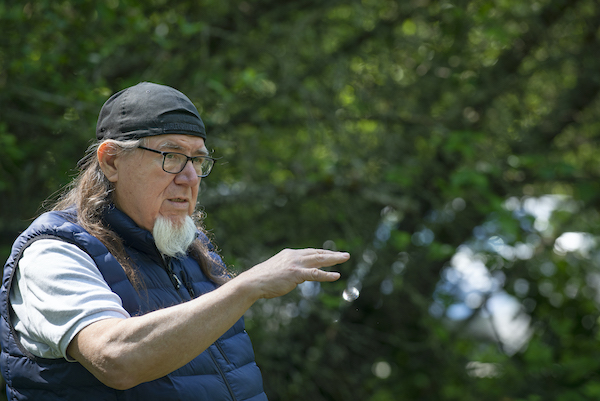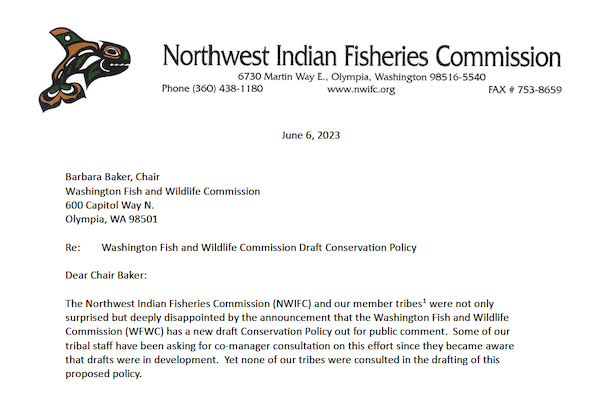
NWIFC Chair Weighs In On WA FWC’s Draft Conservation Policy
Tribal comanagers are “deeply disappointed” by the Washington Fish and Wildlife Commission’s “surprise” announcement this spring that a new draft conservation policy for the governor-appointed panel and WDFW is out for public comment and say they weren’t consulted in the working up of the “vaguely worded” document that threatens harvest.
They also express concern about “the lack of clarity for the reason(s) in developing a new policy” that is supposed to guide state decisions, budgeting and fish and wildlife management, saying it is “less clear in its goals and implementation strategy than the previous policy.”

“The draft policy does not appear to build upon existing conservation policies, nor does it clarify the policy position of the WFWC,” writes Ed Johnstone, chair of the Northwest Indian Fisheries Commission in Olympia. “To the contrary, it is vaguely worded, and some of the vague principles and definitions of the draft seem to conflate ‘preservation’ with ‘conservation.’ Preservationist policies are not consistent with the exercise of our treaty-reserved rights to harvest natural resources, and only serve to frustrate the co-management of these shared resources.”
Johnstone’s June 6 letter is addressed to Barbara Baker, chair of the Washington Fish and Wildlife Commission and one of the coauthors of the draft conservation policy that’s been in the works since at least 2021 and, after several redraftings and re-redraftings, officially went out for public comment this April.
It also comes as powerful Washington legislators, the Governor’s Office and outside agitators work to “reform” WDFW and the commission. In April, they snuck in an unsettling budget proviso requiring the agency’s governance, mandate and more to be reviewed by the Ruckelhaus Center and possibly reformed. Another front in the battle is over the commission’s draft Co-Manager Hatchery Policy, subject partially of a special workshop last Friday.

For her part, Baker has argued that the term “conservation” is used in WDFW’s 25-year strategic plan dozens of times but is never defined, and she worries about “an important and looming crisis ahead” in the form of climate change and other environmental concerns.
“If adopted, this policy will serve as overarching guidance to inform a variety of Department decisions relative to budget development, setting priorities, and the management of fish and wildlife,” Baker said in a commission press release. “With a rapidly developing world and a changing climate, we need to be more responsive to these emerging issues and take a holistic approach to wildlife conservation. We need your feedback to inform the policy’s direction and help us improve this initial lens that we will look through when approaching solutions to a myriad of conservation challenges and providing opportunity.”
Johnstone acknowledges that there are “many challenges” facing fish and wildlife management and that NWIFC and that the state via WDFW and the commission can be leaders on that front “if we advance our collective energies towards collaborative solutions.”
But he points out that Baker’s draft conservation policy doesn’t mention comanagement “at all,” despite NWIFC having raised state participation in sharing fish and wildlife resources not only with the commission, but the Governor’s Office during annual state-tribal Centennial Accord meetings.
Comanagement and NWIFC stem from 1974’s Boldt Decision. Following a long history of suppression of treaty-guaranteed harvest rights by the state of Washington, US District Court Judge George H. Boldt reaffirmed that salmon and steelhead were held “in common,” or equally, between the tribes and state. NWIFC represents 20 different tribes, including Johnstone’s Quinault Nation, as well as Upper Skagit, Lummis, Squaxin Island, Stillaguamish, Swinomish, Tulalip, Jamestown S’Klallam, Nisqually and others.
“Verbal assurances that co-management is important to the state of Washington are not enough. We expect state regulatory, policymaking and management actions to reflect that commitment. This policy statement is the perfect example of a state policy that must include co-management as a foundational principle for species managment in Washington but did not do so,” Johnstone writes.
“Preservationist policies are not consistent with the exercise of our treaty-reserved rights to harvest natural resources, and only serve to frustrate co-management of these shared resources.”
–NWIFC Chair Ed Johnstone
With unspecified “other and more specific concerns with the language” in the draft policy, he asks Baker for a meeting and hopes that tribal comanagers are more involved in drafting this and other policies.
“Conservation is the philosophy by which we will ensure that the resources we rely on, and hold dear, are available for current and future generations,” Johnstone summarizes in his letter to Baker.
Public comment on the draft is open through June 30 here and there will also be a chance to provide input during the commission’s June 22-24 meeting in Seattle.
Input can also be submitted by emailing draftconservationpolicy@PublicInput.com and calling (855) 925-2801, entering code 4262 and leaving a voicemail.
